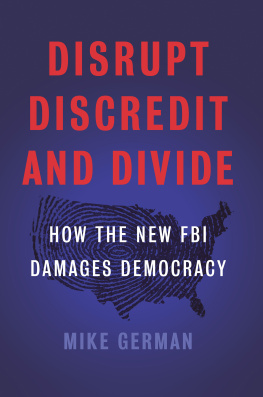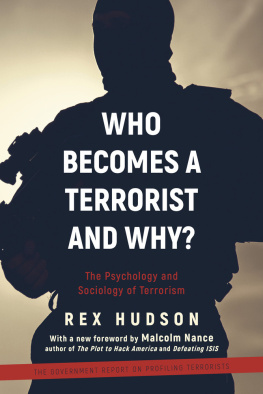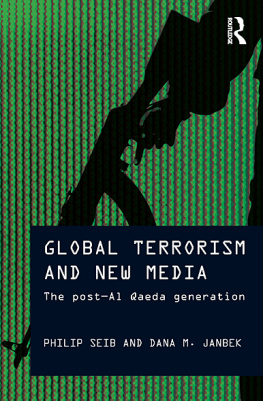Thinking
Like a
TERRORIST
Potomac Titles of Related Interest
Al Qaedas Great Escape: The Military and the Media on Terrors Trail
by Philip Smucker
Counterterrorism Strategies: Successes and Failures of Six Nations edited
by Yonah Alexander
Hide and Seek: Intelligence, Law Enforcement, and the Stalled War on Terrorist Finance
by John A. Cassara
Imperial Hubris: Why the West Is Losing the War on Terror
by Michael Scheuer
Insurgency and Terrorism: From Revolution to Apocalypse
by Bard E. ONeill
Through Our Enemies Eyes: Osama bin Laden, Radical Islam, and the Future of America
by Michael Scheuer
War of the Flea: The Classic Study of Guerrilla Warfare
by Robert Taber
Why Secret Intelligence Fails
by Michael A. Turner
Winning the Un-War: A New Strategy for the War on Terrorism
by Charles Pea
Thinking
Like a
TERRORIST
Insights of a Former FBI Undercover Agent
Mike German

Copyright 2007 by Mike German
Published in the United States by Potomac Books, Inc. All rights reserved. No part of this book may be reproduced in any manner whatsoever without written permission from the publisher, except in the case of brief quotations embodied in critical articles and reviews.
Library of Congress Cataloging-in-Publication Data
German, Mike, 1963
Thinking like a terrorist : insights of a former FBI undercover agent / Mike German.
p. cm.
Includes bibliographical references and index.
ISBN-13: 978-1-59797-025-9 (alk. paper)
ISBN-10: 1-59797-025-5 (alk. paper)
1. TerrorismUnited States. 2. TerrorismUnited StatesPrevention. 3. TerroristsUnited States. 4. War on Terrorism, 2001-5. RadicalismUnited States. I. Title.
HV6432.G48 2006
363.325dc22
2006019251
Printed in the United States of America on acid-free paper that meets the American National Standards Institute Z39-48 Standard.
Potomac Books, Inc.
22841 Quicksilver Drive
Dulles, Virginia 20166
First Edition
10 9 8 7 6 5 4 3 2 1
Contents
Preface
As the fifth full year of Americas Global War on Terrorism wound down, U.S. National Counterterrorism Center statistics revealed the number of international terrorist attacks in 2005 more than tripled those in 2004.
U.S. defense secretary Donald Rumsfeld once complained that he lacked the metrics necessary to measure success in the Global War on Terrorism, We may not have metrics to measure our success, but these realities certainly illuminate our failures. If the Global War on Terrorisms goal is to stop terrorism we are clearly losing. But why?
It is certainly not from a lack of effort. The U.S. military, the most skilled and equipped force in history, is engaged in Afghanistan, Iraq, and other untold places around the globe, demonstrating a national will to go on the offensive against terrorists and the states that sponsor them. U.S. intelligence and law enforcement agencies are now focused on counterterrorism as their top priority, and they are strengthening the countrys defenses as never before. Congress has provided ample funding and has given the administration unprecedented powers to act against threats to national security. The American public has become more vigilant and has generously sacrificed civil liberties in exchange for greater security. The U.S. government has taken the gloves off and adopted aggressive techniques that once might never have been considered: extrajudicial arrests and detentions, renditions, secret prisons, and torture. Yet the number of terrorists and the number of attacks keeps growing. What more can we do?
The overarching problem, I believe, is a fundamental failure to understand terroristswho they are, how they operate, and most important, why they think using indiscriminate violence will get them what they want. Our failure to understand them is peculiar, because terrorism is all about the message and terrorists are vocal about who they are, what they want, and how they intend to get it. They are prolific writers and enthusiastic public speakers, but we rarely pay enough attention to what they write or to what they say. Their words are dismissed as propaganda, hate speech, or the rantings of madmen.
In remarks criticizing leaks from the U.S. intelligence community, White House spokesman Trent Duffy once said, The fact is al Qaedas playbook is not printed on Page One, but he was wrong. The al Qaeda playbook was published years ago in fact, and updates appear regularly on the Internet and in audio and video recordings. These messages clearly delineate the groups operational goals and forecast the expected results. Incredibly, the U.S. governments responses often fulfill their predictions.
Since September 11, 2001, U.S. politicians often refer to the Global War on Terrorism as a new kind of war, but it isnt new. Modern-day terrorists follow strategies pioneered centuries ago by Zealots, Thugs, and Assassins, ancient groups of varying ethnic, religious, and national origin who used bloody murder as a tool of political intimidation and earned permanent places of infamy in our lexicon. Those al Qaeda hijackers who used small knives to take over four planes on 9/11 were throwbacks to the Zealots Sicarii, known literally as dagger-menand to the Assassins, who, as their ideological descendants, were never expected to survive their attacks. Today when U.S. political and military leaders speak of our enemies they often refer to them as zealots, thugs, and assassins without even a hint of irony. While al Qaeda follows an ancient game plan, American leaders pretend its all brand new. This failure to look at the past is our mistake.
International terrorism experts marvel at al Qaedas post9/11 evolution from a hierarchal organization into independent groups of loosely associated, autonomous cells, but white supremacist groups in the United States pioneered this leaderless resistance strategy decades ago and published papers on it. Dont these experts think al Qaeda can read? The sophisticated terrorists of al Qaeda might appear to have little in common with neo-Nazi skinheads living in the United States, but that assumption again ignores history. Hitlers Third Reich had a Muslim Division in Croatia, organized by the Grand Mufti of Jerusalem, and the Nazis had strong ties to the Muslim Brotherhood in Egypt, Palestine, and Iraq. These ideologies are not as different as they might have seemed, and the newly minted term Islamo-fascism is not such a modern concept. A study of these groups methods would reveal more similarities, yet the U.S. government treats domestic and international terrorism as completely different phenomena.
Perhaps it sees al Qaeda as different from the white supremacist movement because it represents a threat from abroad, and perhaps foreign threats justify a different, more vigorous response, such as curtailing traditional protections of civil liberties and due process to ensure that distant enemies cannot establish a foothold in the United States. Try to imagine what would happen to U.S. civil liberties if foreign-born terrorists infiltrated the country and instigated the presidents assassination. Imagine if they staged riots, strikes, and bombings in major U.S. cities, including dozens of letter bombs sent to prominent government officials and business leaders, a suicide bomber blowing himself up on the attorney generals front lawn, and finally, a truck bombing in the heart of New Yorks financial district. Would Americans still care about civil liberties and the niceties of their justice system, or would they expect the government to err on the side of security, to make mass arrests, and to intern or deport people based on any evidence connecting them to the ideas these terrorists espouse? Would the government allow this movements ideological leaders to continue to organize and agitate their followers at public rallies, or would it arrest and deport them for just talking?
Next page









